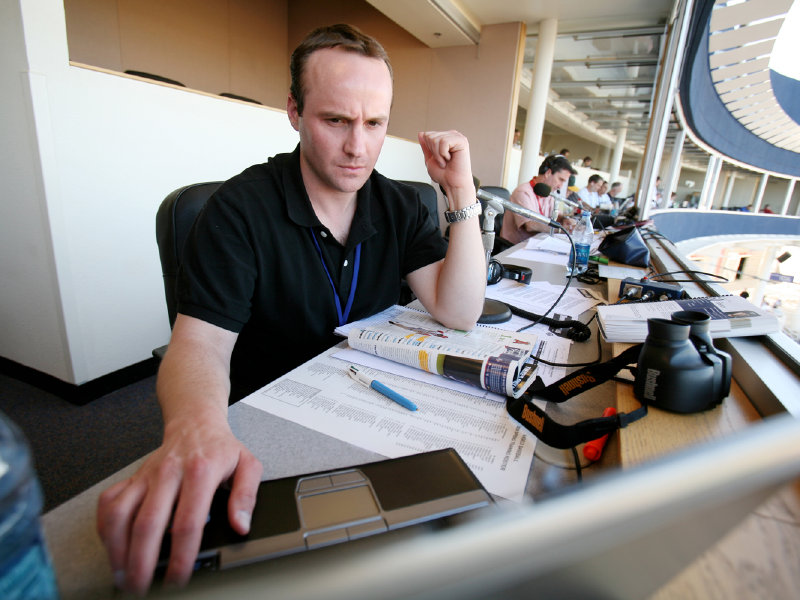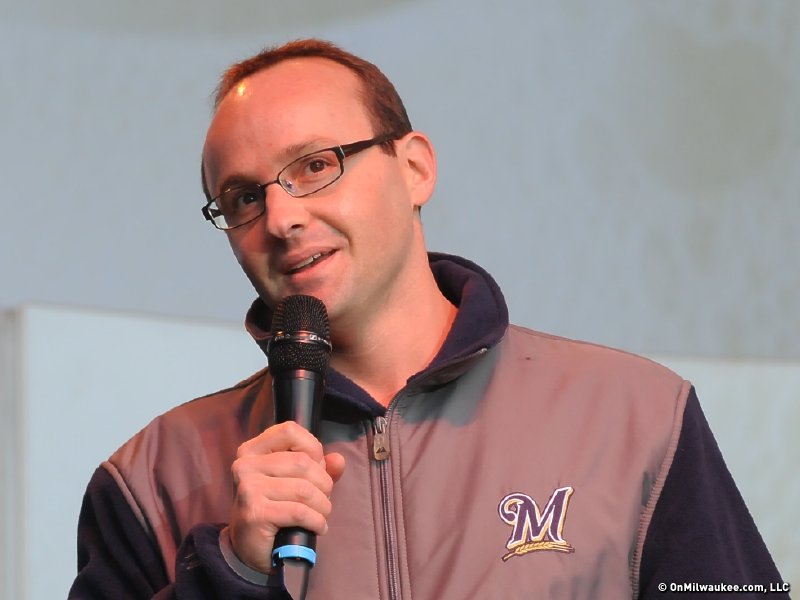Spring training is over, and so are the dress rehearsals.
This afternoon, Cory Provus will settle into the seat next to Bob Uecker inside the visiting radio booth at AT&T Park in San Francisco to call his first regular-season Brewers game and begin building a bond with baseball fans across Wisconsin.
When Jim Powell left Milwaukee after 13 years to become the lead announcer for the Braves in his hometown of Atlanta, the Brewers turned to Provus, 30, whose previous job was as a pre- and post-game host on the Cubs radio network.
OnMilwaukee.com caught up with Provus during spring training and asked him about his new job, his new team and the prospect of working next to a legend like Uecker.
OnMilwaukee.com: How hectic was your spring? You were announced as the Brewers' new radio announcer in mid-February and had to scramble to get down to spring training and get on the air. Have you been able to catch your breath?
Cory Provus: It hasn't been that bad. I've got a place to live in Milwaukee. My stuff will be there when I get back. It hasn't been bad. Actually, the situation is similar to the one I faced a couple years ago. When I got the job at WGN, it was almost the same situation. Andy Mazur accepted a job with the Padres in San Diego and I got the job with the Cubs on the last Monday of spring training. I packed my house and left on Wednesday for Chicago. I had one day to find a place to live, then I flew to Las Vegas to meet the team. It really hasn't been that bad. With e-mail and cell phones and faxes, you can take care of a lot of things remotely. It wasn't like I was going to Mongolia. It was only Phoenix. I wasn't all that stressed out about it.
OMC: Given the proximity to your hometown, the opportunity to work alongside Bob Uecker and the fact that the Brewers are a young, exciting team, this seems like a pretty good fit.
CP: It really is. What a great time to join the Brewers, the city of Milwaukee and the state of Wisconsin. There is so much passion right now, and deservedly so. I saw this team play a bunch the last two years. It's a great, young, exciting team that has a lot of promise. How could anyone not want to be a part of this?
OMC: Now that you've got a few games under your belt, what is it like working with Ueck? You're going to be spending a lot of time with him and Kent Sommerfeld this summer and for the foreseeable future.
CP: Bob has really been tremendous to me. I have so much respect for Bob and the man he is, the Hall of Famer he is. Before I got the job, we got together for dinner in Arizona and everybody asked me if I was nervous, but it wasn't like a job interview at all. It was exactly like I thought it was going to be -- two guys laughing and talking baseball. We talked about the job for five minutes. After that, it was all stories.
OMC: Ueck has a lot of stories.
CP: I love the stories. Ron Santo is a dear friend of mine and he's got a million stories. So does Bob. We had a blast.
OMC: What about Kent? He can be difficult ... I'm kidding, of course. He's one of the nicest guys on the planet.
CP: Kent has been great. He's been part of the broadcast team for more than 20 years and he makes my life easier because he knows the format so well. He knows everything.
OMC: You worked with Uecker's former partner, Pat Hughes, down in Chicago. I'm sure you spoke with Jim Powell when you applied for this job. What did they tell you to expect?
CP: To be honest, in the conversations I've had with Pat and Jim the lasting impression I've come away with is that you're going to have fun. Bob wants to have fun. He wants to call some winning baseball, but he also wants to have fun. I love the fact that he's a former player, especially a catcher, because they see the game differently. I want to ask him about that. That's something I look forward to bringing out in the broadcasts.
OMC: How would you describe your style as a broadcaster?
CP: I don't think you can be too descriptive in a game. You want to paint a vivid, detailed picture of what is going on during the ballgame. You have to challenge yourself to do that.
OMC: Do you have any role models or mentors in the field?
CP: My first mentor was, and probably still is, my cousin, Brad Sham, who has been the voice of Dallas Cowboys for about 30 years. When I was old enough to realize what he did for a living, I realized that he was like me. He loved sports, but he couldn't play. I went in that direction since I was 13 or 14.
I also was fortunate enough to have a front-row seat to learn from one of the best guys in the game, Pat Hughes. I'm a bit of a baseball purist and there is a throwback nature to his style. I love the way he calls a game and uses just the right words. A lot of guys can give you the bells and whistles, but Pat has a knack for using the perfect words to describe the action. I learned a lot from him.
OMC: When it began to look like you were going to get the job, some hardcore Brewers fans bristled at the notion of having a Cubs "fan" and former announcer in the booth at Miller Park. Even though it seems ridiculous to think that you'd secretly be rooting for the enemy, what do you say to those people?
CP: I can't fault people for having passion. The Brewers are a terrific team. It's a challenge I took upon myself to prove to fans that I can do a professional, credible job. There are a lot of things in life we can control. Where we grow up is not really one of them.
CP: Absolutely. I heard Wayne do Bears games, Bulls games, college games. I have vivid memories of Wayne doing Bears games with Hub Arkush and Dick Butkus. I was a huge fan of Wayne's. He's a terrific announcer. I can't wait to meet him and get to talk to him a bit.
OMC: In terms of nuts and bolts, will your job description be like Jim Powell's? Will you do the third, fourth and seventh innings?
CP: That's right.
OMC: I don't now if it's the norm in baseball anymore, but Jim and Bob didn't engage in a lot of cross-talk during each other's innings. Do you envision doing some of that?
CP: I think that's something you have to go through. Ask me again two months from now and I'll have a better feel for that. I'm looking forward to talking to Bob about baseball. He knows so much about the game and I'm sure things will come up. During an exhibition game down here (in Arizona), Bob was talking about Mike Matheny and something popped in my brain about an article I read about big-league catchers who became managers. It led me to ask "did you have any managerial aspirations?" There will be times when I get Bob's input on things.
OMC: One of the things that Jim Powell did during his years with the Brewers was to embrace the minor leagues. Some listeners loved it and some people thought it was excessive. Of course, when the team wasn't playing well there weren't a lot of other things to talk about. What is your take on the minors?
CP: As we've seen throughout baseball, having a strong farm system is vital to success. I'm anxious to follow the guys we have in the minor leagues, because I've been impressed with some of the guys I saw during spring training.
OMC: Which guys caught your eye?
CP: Well, Brewers fans already know about Mat Gamel and Alcides Escobar, who looks like he is going to be a terrific player. I was watching Lorenzo Cain and Nick Green, the pitcher the Brewers picked up from the Angels. There are afew guys that I look forward to following.
OMC: To me, so much of baseball broadcasting is based on familiarity. You watch guys play over a period of time and talk to them in the clubhouse and develop a rapport and a mental file on them. You might have a conversation with a guy in spring training about his experience in college or in the minor leagues and it may pop into your head in August and work its way into a broadcast. You're starting from scratch with most of these guys. What is that process like for you? How do you go about meeting the guys?
CP: I've kind of been taking my time with it. I didn't want to try to meet the team all at once. I've talked to a few guys and introduced myself. I talked to Braden Looper and Chris Capuano the other day and they seemed like nice guys. Once we get into the season, there will be a lot more time to do that. Everybody will be in the clubhouse and there will be routines. That's one of the great things about baseball is that you have downtime not only at the ballpark, but on the buses and waiting for planes. I didn't want to come in and shake hands like a politician and get to know everybody on the first day. The guys that I've spoken to so far -- Craig Counsell, Billy Hall, J.J. Hardy -- they've all be great.
OMC: What about the "evil" media?
CP: That's another difference from Chicago. In terms of the guys who are at the ballpark every day, it's a more intimate group. I've seen the same three people every day. In Chicago, it was a larger group and with that small clubhouse at Wrigley, it made it hard to move around. There was no place for the players to get away. I don't think that will be the case here. That's just another benefit of this job.
OMC: Final question -- how will the Brewers do this year?
CP: This is a dynamic offensive club that is going to hit put some runs on the board. Like a lot of teams, it's a question of how the pitching will hold up. None of the national experts seem to be giving the Brewers much of a chance. Maybe they'll use that as motivation.
Host of “The Drew Olson Show,” which airs 1-3 p.m. weekdays on The Big 902. Sidekick on “The Mike Heller Show,” airing weekdays on The Big 920 and a statewide network including stations in Madison, Appleton and Wausau. Co-author of Bill Schroeder’s “If These Walls Could Talk: Milwaukee Brewers” on Triumph Books. Co-host of “Big 12 Sports Saturday,” which airs Saturdays during football season on WISN-12. Former senior editor at OnMilwaukee.com. Former reporter at the Milwaukee Journal Sentinel.





